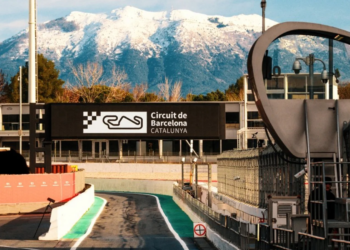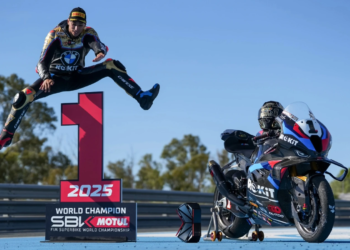Davey Euwema is a 24-year-old writer and motorsport enthusiast based out of Rotterdam, the Netherlands and the Sportscar Editor at MotorsportWeek.com and Motorsport Monday. In this column series, he shares his thoughts, stories and experiences from the world of sportscar racing.
The GTE Pro title decider between Ferrari and Porsche at the Eight Hours of Bahrain was a very controversial affair at the end of what was, frankly, an extremely exciting race and season. However, amidst the contact, protests and appeals, there was a larger issue at play. One that the FIA and ACO would be wise in fixing as soon as possible.
Balance of Performance is an extremely contentious topic in modern sportscar racing. At best, it’s a complicated system put in place to ensure that racing between different cars is as close as it can possibly be. At worst, it’s a perennial scapegoat for teams, drivers and manufacturers when their races do not go as they would have wanted.
The BoP debate reared its ugly head once again at the start of the Bahrain double header when Ferrari unexpectedly had a power cut of some 25 horsepower ahead of the Six Hours of Bahrain. Ferrari reacted by saying they wouldn’t be able to compete with Porsche, finished a distant second behind their German rivals and subsequently called for changes to have their power handed back.
That partially happened, but Ferrari still filed an official protest over the whole affair. It was a saga that rarely left the headlines throughout the week in Bahrain, and not exactly for the right reasons.
It can not be an easy situation for the ACO and the FIA to find themselves in. On the one hand, the reason for Ferrari’s initial power cut was never communicated, which is an easy way to ensure people don the tinfoil hats and come up with explanations of their own, which more often than not completely miss the mark. On the other hand, it is reasonable to believe that such changes to an otherwise automated BoP system are not made without a very good reason.
The problem is that what should have been an on paper extremely exciting title fight between two racing giants was marred by near-endless discussions over whether or not Ferrari was sandbagging or if they truly had been disadvantaged.
Balance of Performance is considered by many to be a necessary evil in a world where manufacturers bring so many different types of cars to a series and expect to be competitive right away. As a result, modern Balance of Performance systems are incredibly complicated and yet, by their nature, are vulnerable to manipulation. The flipside to that is: when it works as it is intended to, it tends to work very well.
Take the GTD qualifying session for Motul Petit Le Mans as an example, where Madison Snow took pole ahead of Benjamin Hites by a margin of 0.001s. Look further down the order and you’ll see that the top four was separated by under two-tenths of a second and the gap between Snow and tenth-placed Daniel Juncadella was only just over half a second. In a class where there is a huge variety of types of engines and layouts, that can only be applauded.
It can be argued that that is an example of the best characteristics of BoP, while the Ferrari-Porsche saga is an example of the worst of it. The thing that ACO and FIA need to worry about is stamping out the worst characteristics fairly soon, otherwise things could get very messy.
The reason why is that the Hypercar category, set to encompass top-level prototypes from Toyota, Ferrari, Porsche, Audi, Cadillac, Alpine and BMW, will also feature a Balance of Performance system. It already does, as the first season of the Hypercar class saw Toyota, Glickenhaus and Alpine compete under Balance of Performance.
Again, at best, that could potentially mean that we will see phenomenally close racing between top prototypes from some of the biggest names in the business. At worst, there’s the potential for a political nightmare.
Just think back to what occurred between Ferrari and Porsche at Bahrain, with accusations, claims, protests and one headline after another. Then realize that was between just two manufacturers that were not racing for overall honours. That’s not to say that the GTE Pro world title is not important – it obviously is – but at the end of the day it was a dispute between two GTE squads.
Now think what could potentially happen with a potential dozen top-line manufacturers, all with massive investments at stake, fighting for their chance to win the 24 Hours of Le Mans and the world championship overall.
It’s even already slightly happened, with Jim Glickenhaus claiming on social media last month he wasn’t interested in taking part in a ‘Toyota parade’ and calling for a fairer BoP. That can be put down as the maverick American just stirring the pot, something he does very well, and he has now committed to a second season in WEC, but it is an inkling into the sort of discussions that could potentially lie ahead of us.
Balance of Performance is an obscenely complicated topic and most of us don’t know the first thing about it. There’s one thing we can say, however: the ACO and FIA have it in their own interest to make sure any BoP issues are ironed out before 2023, or we could see a political firestorm the likes of which the sport has rarely seen before.









Discussion about this post